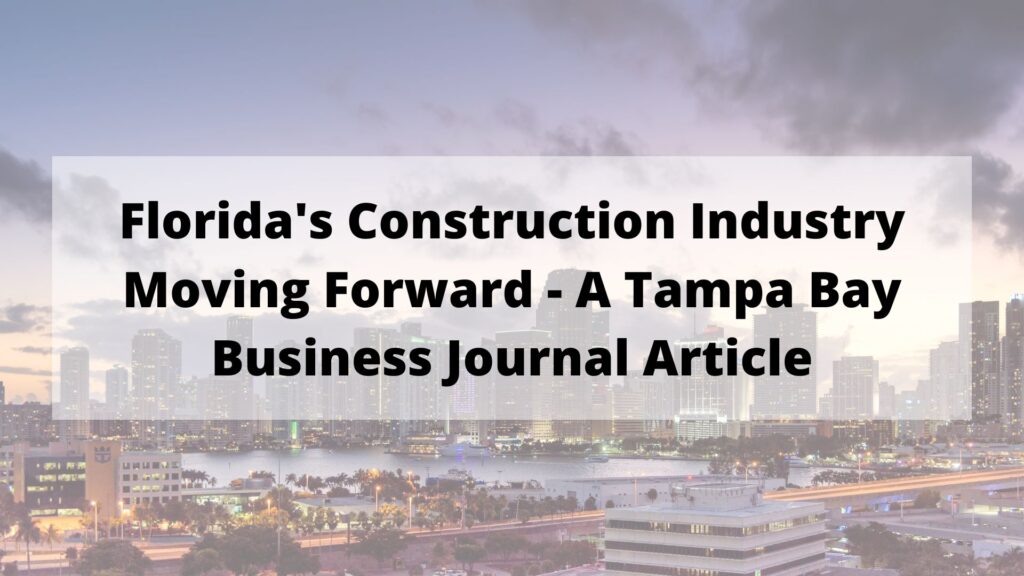
The Law Offices of John Caravella, P.C. does not own this content. This content was created by Davis Reed , President at Clout Construction, and was published to the Tampa Bay Business Journal on May 17th, 2023.
New technologies and approaches are transforming the construction industry, and I believe its future will be one of innovation, efficiency and sustainability. Let’s look at some trends I see as particularly important.
1. Emerging technology
3-D printing is another emerging tech that I believe will revolutionize construction. This technology allows builders to “print” building components and in some cases even entire buildings using a variety of materials, including concrete, metal and plastic, which substantially reduces waste and increases efficiency. This technology is already being used to build affordable housing in developing countries, and it could potentially even help solve the U.S. housing crisis.
Robotics and automation are also key to the future of construction. Drones are being used to survey sites, monitor progress and inspect buildings, reducing the need for manual labor and increasing accuracy. Autonomous vehicles and equipment are also being developed to reduce the risk of accidents and improve productivity. Finally, robotics have the potential to automate repetitive and dangerous tasks like bricklaying and welding, freeing up workers to focus on more complex tasks and reducing the risk of injury. As the technology becomes more advanced and affordable, I expect robotics and automation to transform the construction industry even more.
2. Sustainability and collaboration
Sustainability has been a major trend across all industries for several years now and will continue to be an important factor in design and construction. Green building practices and materials are only becoming more popular, and smart companies will focus on reducing the environmental impact of their construction projects. Renewable energy sources such as solar and wind power are being incorporated into building design, reducing energy costs and carbon emissions. The use of recycled materials and modular construction is also increasing, reducing waste and improving efficiency. Finally, the concept of the circular economy is gaining popularity in the construction industry; while this idea has different meanings in different areas, here, it encourages designing buildings that can be easily disassembled and recycled at the end of their life cycle.
The future of construction is also likely to be more collaborative and integrated. The use of digital platforms and tools is enabling greater collaboration between architects, engineers, contractors and owners. The adoption of lean construction principles is also helping to reduce waste and improve productivity.
Final thoughts
My company has tried to stay ahead of these advances from day one. We heavily rely on digital platforms for daily operations and communication. All superintendents have laptops with access to these platforms for modeling and take-offs.
We also research and try to incorporate new technology and building methods regularly. Currently we are working to incorporate a magnesium oxide panel construction system into new multi-family construction. Magnesium oxide has many benefits over traditional wooden panel systems, including being fire resistant, corrosion resistant and termite resistant.
The biggest obstacle in incorporating new building technologies, in our experience, has been hesitation from lenders and insurers to support these new methods.
In conclusion, digital technologies, 3D printing, robotics, automation, sustainability and collaboration are all transforming the construction industry. As the future promises further rapid change and innovation, I encourage construction companies to adapt to the changing needs of their clients and create buildings and infrastructure that are more efficient, sustainable and responsive to the needs of communities.
 John Caravella Esq., is a construction attorney and formerly practicing project architect at The Law Office of John Caravella, P.C., representing architects, engineers, contractors, subcontractors, and owners in all phases of contract preparation, litigation, and arbitration across New York and Florida. He also serves as an arbitrator to the American Arbitration Association Construction Industry Panel. Mr. Caravella can be reached by email: [email protected] or (631) 608-1346.
John Caravella Esq., is a construction attorney and formerly practicing project architect at The Law Office of John Caravella, P.C., representing architects, engineers, contractors, subcontractors, and owners in all phases of contract preparation, litigation, and arbitration across New York and Florida. He also serves as an arbitrator to the American Arbitration Association Construction Industry Panel. Mr. Caravella can be reached by email: [email protected] or (631) 608-1346.
The information provided on this website does not, and is not intended to, constitute legal advice; instead, all information, content, and materials available on this site are for general informational purposes only. Readers of this website should contact their attorney to obtain advice with respect to any particular legal matter. No reader, user, or browser of this site should act or refrain from acting on the basis of information on this site without first seeking legal advice from counsel in the relevant jurisdiction. Only your individual attorney can provide assurances that the information contained herein – and your interpretation of it – is applicable or appropriate to your particular situation. Use of, and access to, this website or any of the links or resources contained within the site do not create an attorney-client relationship between the reader, user, or browser and website authors, contributors, contributing law firms, or committee members and their respective employers.
